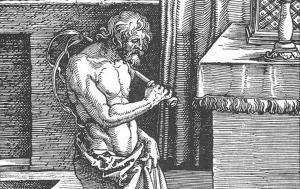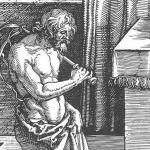
The common Evangelical interpretation of Job is that God is responsible for our sufferings, consciously allowing Satan to persecute us. That same common interpretation, taught in churches all over the world, states that Job was a righteous man who refused to blame God for his loss, and was commended by the Lord for his piety. In the introductory post on the book of Job, I argued that this is the absolute opposite of what the text shows us, and that the wool has been pulled over our eyes, with devastating consequences. Today, I’ll begin to demonstrate this from the text.
What do we know about Job?
- We know first of all that Job was rich – the richest man in all the East, in fact, owning thousands of heads of sheep and cattle, and employing many servants in his vast operation.
- Secondly, we know that Job was not a Hebrew and didn’t have any knowledge of the Lord as revealed through Abraham. He was a man with his own view of God, whose behaviour and ultimately, whose words, demonstrated the nature of those beliefs. For the Christian reader, it is wrong to assume that Job’s ideas about God have anything to do with their own. I don’t have the space to explain that in detail here but will share a link to the full material at the end.
- Thirdly, we know from chapter 1, verses 4-5 that he was terrified of making even the tiniest misstep before God: His sons used to hold feasts in their homes on their birthdays, and they would invite their three sisters to eat and drink with them. When a period of feasting had run its course, Job would make arrangements for them to be purified. Early in the morning he would sacrifice a burnt offering for each of them, thinking, ‘Perhaps my children have sinned and cursed God in their hearts.’ This was Job’s regular custom.
We understand from this that after his children held parties, he made sacrifices for sin that might have been committed to pacify an exacting God. We are not talking about the usual excesses that occur at parties; his concern was that his children might have ‘cursed God in their hearts’. Job had no idea whether or not this had taken place, but he wasn’t taking any chances. This is our first indicator of Job’s view of the Lord, which was one of utter terror.
With this understanding, we can begin to look at the words of Job. Towards the end of chapter one, we read of Job’s first set of troubles – the slaughter of his servants, the fiery consumption of his livestock, the theft of his camels, and the tragic death of his children. Job’s response was as follows:
‘At this, Job got up and tore his robe and shaved his head. Then he fell to the ground in worship and said:
‘Naked I came from my mother’s womb,
and naked I shall depart.
The Lord gave and the Lord has taken away;
may the name of the Lord be praised.’
In all this, Job did not sin by charging God with wrongdoing.’
The robe-tearing and head-shaving were outward shows of grief – an expected cultural display, common in the Middle East – but his first words were not of his loss, but in defence of the Lord, who he believed to have done this to him. Job was so conscious of behaving perfectly that his first priority was to avoid charging God with wrongdoing, for fear that he would be struck down. Spoiler alert – by the end of the book, Job is neck deep in exactly this. Throughout chapters 10-31, Job nakedly accuses God of wrongdoing.
Job has lost his children, but his first concern is to say the right thing. He did not know that the Lord is with us in grief and pain.
Chapter 2 – Job holds his tongue
Job is beset by physical afflictions such as painful sores, erupting all over his body. He hunkers down in the ashes and despairs. At this stage, his wife criticises him (verse 9):
‘Are you still maintaining your integrity? Curse God and die!’’
I don’t know about you, but my other half knows me inside out, and I’m inclined to defer to a wife’s understanding of her husband. Job believes that to curse God is to die, but as we see from later chapters, he is also convinced that he has done no wrong and doesn’t deserve what’s happening to him. He is tongue-tied, fearful of sinning against God but convinced of his own righteousness, as we will see in later chapters of the book. Job was frightened of responding honestly because God would punish him if he did. This then, was his response to his wife in verse 10:
‘He replied, ‘You are talking like a foolish woman. Shall we accept good from God, and not trouble?’
In all this, Job did not sin in what he said.’
At this early stage, Job is still watching his tongue, and though the Bible makes it clear that he did not sin ‘in what he said’, it doesn’t comment on what was going on in his heart. Nor does it comment on the truth of his words – simply that he does not accuse God.
Chapter 3 – Job’s view of God is exposed
Job speaks, lamenting his suffering and wishing he was dead. He is in deep personal anguish – not just the trouble of the body, but the anguish of the mind. Life no longer makes sense to him, and he wishes he was never born. Much of the chapter is devoted to lamentation, but verse 25 shines a revealing light on Job’s inner world:
What I feared has come upon me;
what I dreaded has happened to me.
If we remember Job’s obsessive sacrifices, what sense can we make from this? Job had lived in fear of disaster, of punishment for sin. He never knew or trusted the goodness of God. His spirituality was based on two key pillars – his own goodness and terror of the Lord. If he mis-stepped in the first he’d fall foul of a legalistic, vengeful God.
This glimpse into Job’s true beliefs is the first rumble of a thunderous avalanche, which takes up the majority of the rest of the book. Job’s heart is increasingly exposed as he assaults and accuses God, naming him his enemy, an unjust judge, the destroyer of hope, his opponent, and much, much more, while fiercely defending his own blamelessness and innocence. The text is so explicit, we can only conclude that Job is a self-righteous man who believes the blessing of God is inherited through perfect behaviour. He stands on his own perfection and accuses God of being fundamentally unjust, blaspheming with every breath.
The continuing story
We’ve got this so badly wrong, teaching the very opposite of the true message of Job. As a result, I believe many of God’s children are in terrible bondage, unable to trust their God on a subconscious level – if he did it to Job, why wouldn’t he do it to you? If, we see tragedy as an expression of the will of God, we have zero chance of drawing comfort from him, as the most innocent and instinctive part of us will feel profoundly unsafe. And so it should. Our God is not the author of suffering, and we, his children, really ought to know that, but we’ve been deceived by terrible teaching on the book of Job, and many millions of Evangelical believers are confused about God’s very nature.
I plan to post a comprehensive series on the book of Job over the next few months, taking it several chapters at a time, but will intersperse these with posts on other topics for the sake of variety. For readers who want to sink their teeth into this straight away, I’ve written a book called Job: A Story of Salvation that examines the text chapter by chapter (under a pen name, James Bewley). For UK readers, Job: A Story of Salvation can be found here. I urge anyone who feels stuck in the mire of heavy, Evangelical dogma to read this book – it will give you the tools to break off your shackles!













